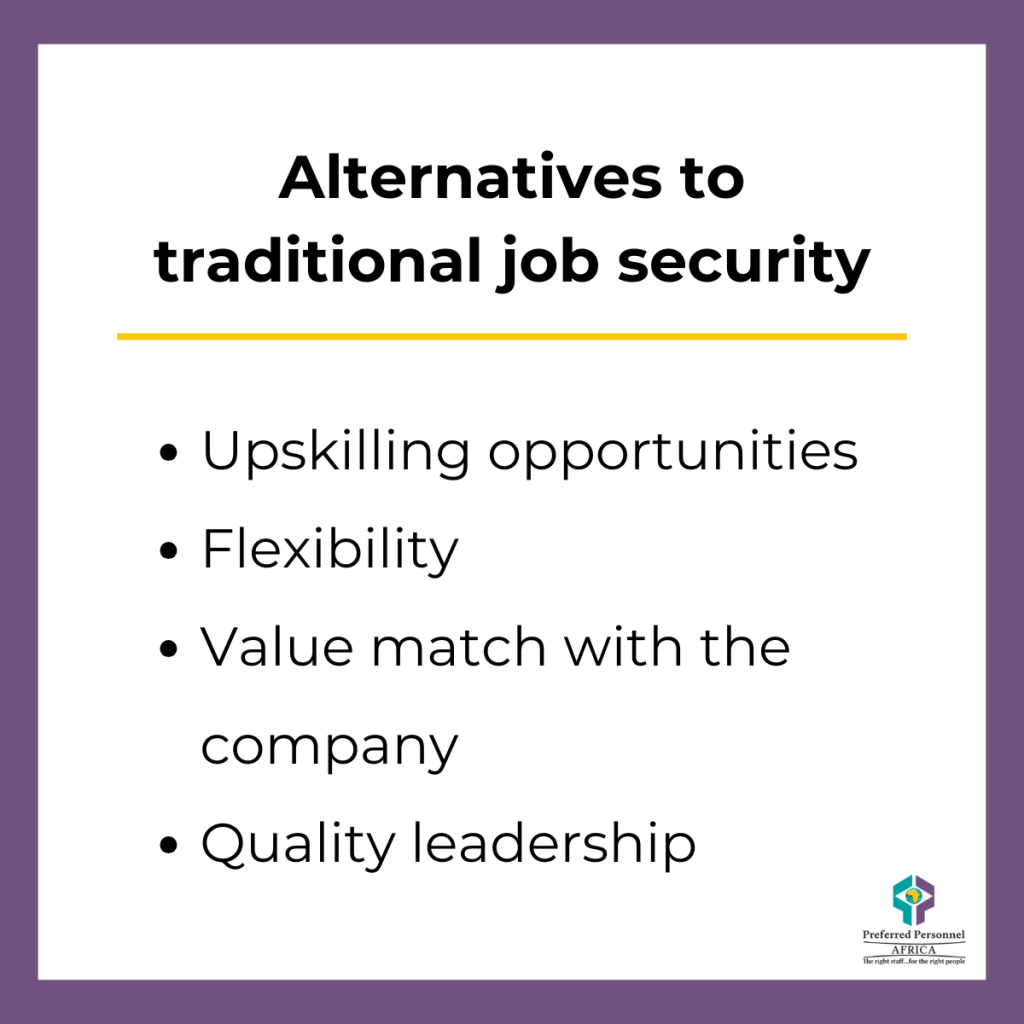By Leigh-Ann Athanasius
For decades, the sequence of life has been clear; go to school, get a good job, climb the corporate ladder, retire and be able to live your life on your pension. But in today’s fast-paced and often unpredictable labour market, that sense of long-term stability seems increasingly rare. So much so, that it poses the question, has job security become a thing of the past? And if so, what should we be looking for instead?
The Evolution of Job Security
As recently as two generations ago, job security was the thing that every working person was aiming for. The narrative of keeping our head down and working hard to climb the ladder was the only one that was known. This was true even in the private sector. And it worked – for the time.

However, as the world began to change and globalisation and technology started to become more prevalent, the landscape of the labour market shifted as well. Automation meant that fewer workers were needed for certain tasks. And we can see this happening again today with the rise of the gig economy and artificial intelligence affecting even skilled white-collar workers. Job security is becoming more fleeting. The Covid-19 pandemic demonstrated just how fragile the job market really could be with entire industries being affected and with the world still experiencing waves of mass layoffs across industries till date.
Is Job Security dead?
It may not be dead be, but it is dying in the way that it is traditionally understood. A major contributor to this is the current state of the global economy and the way companies are choosing to operate. Many organisations are opting for project-based hiring and limited time contract work rather than open ended employment. This obviously affects job security because there is no guarantee of renewal of contracts once the time has lapsed. Unfortunately, this is likely to continue to be the case as it trickles down from clients going project based with service providers rather than locking themselves down with retainer contracts.
There are also unforeseen circumstances that can impact the viability of job security, even if tenure has been granted to an employee. If the organisation has lost funding, then no matter how stable the job used to be, the employee is likely to lose their position.
However, it’s not all doom and gloom. Pockets of stability still exist, just in a different form now.
What Does Job Security Look Like Now?
Today, job security is redefined as career adaptability and sustainability. How likely are you to adapt to the changes in the working environment? The main pillar of this is skills security. Ensure that you are learning new skills and adapting to the market demands to maintain employability even as some jobs become obsolete. The common rhetoric now is that “you may not be replaced by AI but may be replaced by someone who knows how to use it.” Ensuring that you are up to date with the latest skills necessary for your industry is the best way to create a sense of job security.
Financial resilience is more important than ever. Employees need to have sound financial planning like setting up emergency funds and controlling debt to ensure that in the event they lose their jobs, they are able to have a cushion to tide them over. In line with this, income diversification is becoming the norm now. Gone are the days when it was easier to live the life you wanted on a single income in the household. Hustle culture has helped drive the narrative of having supplementary income beyond your salary. More workers are opting to freelance, start online businesses, or cleverly invest to increase their streams of revenue which reduces the dependency on a single employer.
Alternatives Employees Look for in an Employer
Given this shift, some of the things job seekers are looking for in a job, besides compensation and benefits, include whether the company values align with their own, flexibility in terms of hours and ability to work remotely, quality leadership, and most importantly, upskilling opportunities.

When job security can no longer be used as selling point to attract talent, these alternatives can create that sense of ‘safety’ or ‘stability’ in the workplace. If there is a value match, the employee knows that the organisation will treat them well and create a sense of belonging even though long term employment can’t be guaranteed. The same reasoning applies to good quality leadership and transparency within the organisation where there is clear communication so that employees know where they stand in terms of stability within the company.
Flexibility and upskilling lean into the new wave idea of what job security looks like. It gives employees the opportunity to pivot both within the company if their role needs to be redefined; and if they need to leave and explore external opportunities. Upskilling also helps employers stay up to date with any changing technologies and industry insights that ultimately offer value to the organisation’s operations. Flexibility creates a different version of job security because it gives the employee more control over their work-life balance which may be more of a priority to them.
Ultimately, these shifted priorities can be more valuable to employees and employers alike and can even lead to increased loyalty despite there not being the promise of traditional job security.
As much as job security as we once knew it may be fading, that doesn’t mean all hope is lost. It has simply evolved into its next form focused on resilience, adaptability, and continued learning. Instead of expecting long-term promises from companies, today’s workers are taking ownership of their own futures. In this next era of the workforce, you almost need to expect the unexpected and rely on your skills and mindset to help you navigate the ever-changing landscape that is the job market today.



